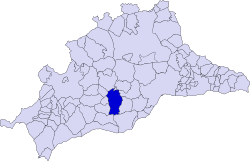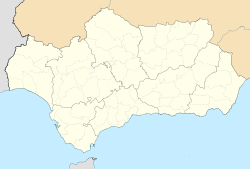This article needs additional citations for verification. (April 2023) |
Coín (Spanish pronunciation: [koˈin]) is a town and municipality in the Province of Málaga, Spain, c. 33 km west of the provincial capital, Málaga, and about 30 km north of Marbella. The town has an official population of 22,000 inhabitants.
Coín | |
|---|---|
 | |
 Location of the municipality of Coín | |
| Coordinates: 36°40′N 4°45′W / 36.667°N 4.750°W | |
| Sovereign state | |
| Autonomous community | |
| Province | |
| Comarca | Valle del Guadalhorce |
| Government | |
| • Mayor | Fernando Fernández Tapia-Ruano |
| Area | |
• Total | 127.37 km2 (49.18 sq mi) |
| Elevation | 202 m (663 ft) |
| Population (2018)[1] | |
• Total | 21,716 |
| • Density | 170/km2 (440/sq mi) |
| Website | Official website |
Foreigners now make up a substantial proportion[clarification needed] of the town's inhabitants and are attracted to Coín because it is only 25 minutes from the beaches of Málaga and Marbella, including the 50 km stretch of coastline in between which includes the popular resorts of Torremolinos, Fuengirola and Benalmádena.
History
editThe town was ruled by the Moors and the Romans, with the Moors invading and controlling the town from 929 AD until 1485, when the Christians retook control of Coín.
Its ancient name was Dacaun which is from Arabic of unknown meaning; Coin is a corruption of this over time and bears no relation to the modern word coin, despite folk etymology associating it with this.
In 929 the area was caught up in the Muladí (Christian convert to Islam) rebellion which was led by Omar Ben Hafsun against the Emirate of Cordoba. Abderraman III, the first Caliph of Cordoba, fortified Coin, improving its defences to stave off the attacks of the muladí rebel.[2]
Economy
editThe economy was traditionally agriculture, coexisting with marble mining (since Roman times) and ceramics. The latter has become very important and well known during the twentieth century, having a colour of its own called "Green Coin". The most important ceramics workshop during the past century was the "Cumbreras" workshop and now local artisans continue this 300-year-old, traditional, ceramic craft.
Cinema city
editThe city of cinema was a project carried out in the area of Nacimiento to produce a television series, but was turned into a tourist area as well. For many years, Coín was the setting for several series, first the British Eldorado for the BBC, and after that the Andalusian serials "Plaza Alta" and "Arrayan", both recorded in Loasur studios produced by Linze TV, and shown by Canal Sur. Tourism, construction, and the hospitality industry have replaced old industries, although there are still many potters and several quarries where local marble, dolomite rock and sand are produced for construction materials.
References
edit- ^ Municipal Register of Spain 2018. National Statistics Institute.
- ^ "Coín - Malaga Province, Andalucia". Spain-Holiday.com. Retrieved 29 April 2023.
External links
edit- Official website
- Website of tourism, culture, leisure in Coín
- . Encyclopædia Britannica. Vol. VI (9th ed.). 1878. p. 117.




